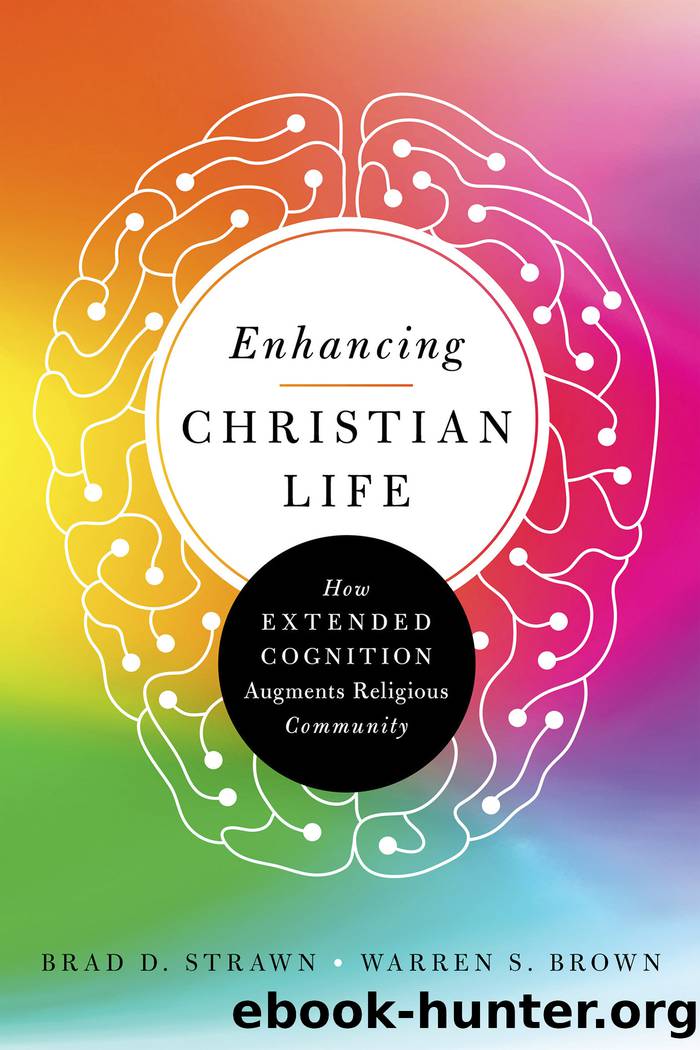Enhancing Christian Life: How Extended Cognition Augments Religious Community by Brad D. Strawn & Brad D. Strawn & Warren S. Brown

Author:Brad D. Strawn & Brad D. Strawn & Warren S. Brown
Language: eng
Format: epub
Tags: neuroscience;psychology;spiritual formation;practical theology;congregational life;cognitive extension;extended cognition;brain science;neuroscience and faith;mind;brain;spirituality;technology;embodied;relationships;church community;community of believers;social network;extended cognition and Christianity;religious tradition;local network of believers;Christian community
Publisher: InterVarsity Press
Published: 2020-07-03T07:18:07+00:00
EXTENSION IN LITURGIES OF WORSHIP
The primary event of the life of a congregation is, of course, worship. The shared liturgies of prayer, Scripture, singing, Eucharist, and preaching provide opportunities for extension into a corporate cognitive and spiritual space. Although the events of worship are to a greater or lesser degree prescribed in a liturgy, they can nevertheless offer opportunity for joining (coupling into) a wide network of congregational interactivity. Elements of worship actively engaged in unison by a group of people constitute extensions into something greater than the individual worshiper. People who genuinely engage in (soft couple with) corporate worship extend their minds and Christian lives outside of themselves into the interactive space of worship. Engagement in the liturgies of corporate worship also extends the individual into the âmental institutionsâ of the Christian faithâthat is, into the accumulated expressions of the church over many centuries.
In chapter four we talked about a hammer as offering the opportunity for physical extension. However, we noted the difference between soft coupling and mere handling of a hammer. If one merely carries a hammer from here to there, no coupling or extension occurs. But if one begins to drive a nail with the hammer, the hammer soon becomes an extended part of the body, transparent in its contribution to goal-directed activity (to a greater or lesser degree depending on oneâs hammering expertise). Similarly, involvement in worship can constitute genuine extension and coupling when we are interactively engaged in (extended into) the events of the worship. Alternatively, if one attends church to merely watch and listen (or watches a televised worship service) without actually becoming interactively engaged, there is little, if any, enhancement of Christian life. Perhaps in watching and listening we can pick up an element or two that is useful for our individual life and thoughtâwhich is not useless, just relatively puny.
It would seem that the move to extend into worship (or any other object or social interaction) must involve an act of the will, even if it is an unconscious act. The mere presence of an object or social situation that affords the possibility of extension does not automatically elicit the sort of interactivity that would constitute soft coupling, cognitive extension, and enhancement. There must be a move on the part of the individual to engage the opportunity. Similarly, there must be a reciprocal move on the part of other members of the community to engage the individual. Woody Allen was off the mark in saying, âShowing up is 80 percent of life.â12 Just showing up is insufficient.
In thinking about the possibility of extension and enhancement through corporate worship, it is instructive to consider more specifically the various elements in a typical worship liturgy.
Prayer. Individual prayer is a powerful practice in which a believer may sense the presence of God, voice concerns, intercede on behalf of others, receive a word from God, and even experience transformation. (We will discuss in the next chapter the degree to which private devotional prayer is not entirely understandable as a private and individual event.
Download
This site does not store any files on its server. We only index and link to content provided by other sites. Please contact the content providers to delete copyright contents if any and email us, we'll remove relevant links or contents immediately.
The Secret Power of Speaking God's Word by Joyce Meyer(3180)
Signature in the Cell: DNA and the Evidence for Intelligent Design by Stephen C. Meyer(3130)
Real Sex by Lauren F. Winner(3014)
The Holy Spirit by Billy Graham(2944)
The Gnostic Gospels by Pagels Elaine(2527)
Jesus by Paul Johnson(2352)
Devil, The by Almond Philip C(2324)
23:27 by H. L. Roberts(2248)
The Nativity by Geza Vermes(2226)
Chosen by God by R. C. Sproul(2161)
All Things New by John Eldredge(2159)
Angels of God: The Bible, the Church and the Heavenly Hosts by Mike Aquilina(1957)
The Return of the Gods by Erich von Daniken(1943)
Angels by Billy Graham(1922)
Knowing God by J.I. Packer(1854)
Jesus of Nazareth by Joseph Ratzinger(1811)
The Gnostic Gospel of St. Thomas by Tau Malachi(1793)
Evidence of the Afterlife by Jeffrey Long(1786)
How To Be Born Again by Billy Graham(1777)
